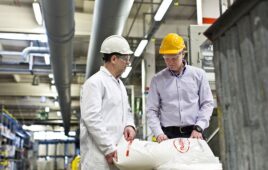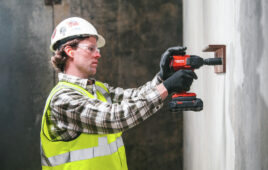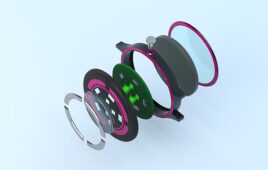Written by Mary Gannon, Editor
Design World
As the United States continues to deal with COVID-19, the disease caused by the most recent Coronavirus pandemic, one theme has run through all media outlets — the looming shortage of face masks and other non-woven protective medical gear including gowns and boots that doctors and nurses need to safely treat patients.

With the COVID-19 pandemic, grave concerns have been raised over a shortage of protective medical gear including face masks. Emerson’s Branson brand has stepped up its production of a standard assembly of its welder for bonding these non-woven fabrics together to ensure hospitals have the supplies they need.
The urgent need has numerous manufacturers stepping up to increase production. One example is Emerson’s Branson — its customers use its ultrasonic technology to manufacture these non-woven garments quickly, safely and cleanly.
Branson representatives told Design World that not only are its current ultrasonic clients stepping up production, new clients in parallel industries and completely new manufacturers are purchasing the technology to increase production of these critical medical garments.
Emerson offers Branson ultrasonic equipment that can slit, bond, seal or quilt nonwoven synthetic materials to meet a wide range of medical and non-medical application requirements. Medical applications include surgical face masks, face shields, disposable hygiene products, gowns, and filter media.
William Vaughan, VP of Business Development and Global Marketing for Emerson’s Branson, said that unlike other types of bonding methods, Branson’s ultrasonic bonding uses friction and pressure to bond materials directly together. “There are other alternative joining techniques. You can use adhesives or glues, but that requires additional products, which means additional cost, and also has the potential of introducing a new contaminant into the process,” Vaughan said. “With ultrasonic welding, the bonded material is just as strong as the original material that was welded together.”
Additionally, traditional sewing means you are creating tiny holes which can allow microscopic contaminants to travel through the fabric. “You can also weaken these materials as you put holes in them through traditional sewing,” he said.
Eliminating those tiny thread holes also means eliminating more contamination potential, said Vaughan.
The technology takes large rows of non-woven fabric and splits them into narrow strips, and then they are bonded or quilted together, similar to the many ply-rolls of toilet paper, to ensure higher absorbency. “It’s a fast, automatic process for ensuring strong, repeatable bonds of disposable fabric-type material that needs to be sterilized and free of contamination,” Vaughan said.

Branson ultrasonic equipment can slit, bond, seal, or quilt nonwoven synthetic materials to meet a wide range of medical and non-medical application requirements. Medical applications include surgical face masks, face shields, disposable hygiene products, gowns, and filter media.
Ultrasonic welding is also used in consumer and personal care products, baby diapers and training pants, mattress pads, seat cushions and covers, household mops and cleaning products, disposable vacuum and filter bags, and more.
As a result of this, non-wovens are one of the fastest growing segments in Emerson’s space, Vaughan said. And because Emerson is such a large global brand with manufacturing facilities in the North America, Europe and Asia, the company has been able to rapidly come up with a solution to help with this critical shortage.
Because of increased demand beginning in Asia, where the virus originated, followed by Europe, Branson has been “ramping up production, and making some standard assemblies so we can increase production and get these products to our customer as fast as we can,” Vaughan said.
Vaughan said that as an essential business, Branson has been using a shift schedule of production that’s in line with social distancing guidelines and is producing the ultrasonic welders in a timely manner.
While many of its current customer base uses proprietary processes that require custom Branson designs, the company has developed a standard assembly that is being sold to new customers to ramp up production as quickly as possible. “Some of these are existing customers, others are in adjacent spaces and others are manufacturers in different industries that understand they have the capacity right now to assist in this particular challenge to make additional products,” Vaughan said.
Emerson
www.emerson.com
Emerson’s official COVID-19 response is below:
The safety and health of our employees is Emerson’s top priority. We are working closely with public health officials in cities and countries where we operate to monitor COVID-19. We are continuing to evaluate and implement alternative work schedules and work from home arrangements as appropriate and in accordance with local policies, to ensure employee safety and business continuity.
We have also established policies across the company related to working conditions, adaptable to local markets, including: limiting or eliminating non-essential travel; prohibiting in-person meetings and gatherings of more than 10 people; and limiting or eliminating visitors to Emerson locations.
We are directing all employees to follow local policies relative to their personal daily activities, with a priority placed on self-care, family welfare and minimizing the spread of this virus. If any Emerson employee tests positive for COVID-19 and must enter a self-quarantine, rest assured we will provide a balanced wage or salary continuation plan that is compliant with each country’s practice so the employee can focus on their health and recovery.
We are taking all steps to keep our employees safe while continuing to support our customers who operate in industries that are vital to battling this pandemic. We are focused on enabling our customers to continue delivering the products and services that are essential to day-to-day life across the pharmaceutical, medical, food and beverage, food safety and distribution, and power industries. In addition, we are making some of our plants available to help meet the federal government’s call for critical equipment production.





Tell Us What You Think!